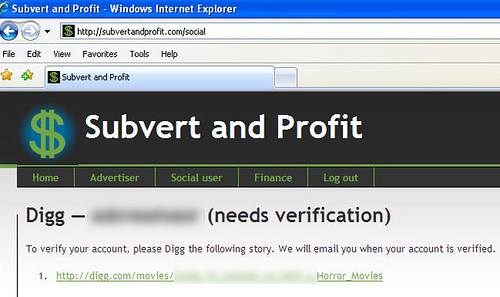Many of you know I’m writing more and more about Digg. I’ve become deeply involved in the community and I’ve gotten a greater understanding of what stories make it to the main page. I’m about to break the Top 100 (that list is here). It’s something, that, as Muhammad Saleem said, is because of a heightened awareness of what that community seeks:
Because they understand the nuances of the site and the preferences of the community, they are able to submit content that is appreciated by the democracy-based community of Digg and the content is consequently promoted to the home page.
When I submit a story to Digg, I have a good deal of confidence that my stories have a decent chance of hitting the main page, typically because I generally look for the content that is worthy of a Digg front-page mention. That’s why I was astonished when I saw a story in my feed reader that I ultimately submitted to Digg get buried at 43 votes. I spotted an anomaly that I typically didn’t detect once the story got buried: the rate at which it was being Dugg still grew, and by the time I checked the story again just a few hours later, it had an additional 60+ votes. Typically, buried stories taper off. They don’t grow like this. The community saw the piece and felt, like me, that it was deserving of a front page promotion, but the story inexplicably didn’t make it.
I emailed Digg. This wasn’t normal. They responded saying that the story was reported as “Lame” and was buried. It’s still the Digg democracy, after all. Fair enough, I suppose, though I didn’t want to believe it.
And then I got an email from the person who wrote the story, and he said he was responsible for the reason why the story was buried.
He explained, after my insistence to be honest with me, that he used the service Subvert and Profit.
I learned later that he ran a few experiments after the story got buried. He got a number of votes (Subvert and Profit users are required to Digg the story to receive payment), but he saw that each story would not just die off after time as expected from lack of votes — they’d simply get buried, implying that there was a significant human element involved in preventing the promotion of the story. He learned, and we suspect that this is the case, that these submissions were buried after they were Dugg. Interestingly, this is how Digg works; you can bury a story after you Digg it, but you cannot Digg a story after you’ve buried it. It is possible that Digg is well aware of this and made it possible so that people trying to Subvert and Profit will not end up being able to successful when gaming the system. In any event, it makes things a lot clearer for me.
From the few screenshots I requested from this individual, I learned that the system works like this. You log into your account and confirm it by Digging a random story.
Once your account is confirmed, you get a page that features a number of upcoming stories. Users are required to Digg the story, but then they can bury it. The system doesn’t account for buries and can’t detect if you’ve buried it; as long as their vote is counted, nothing else matters. The people behind the voting get their money. Advertisers get no guarantees.
Naturally, it all looks very suspicious. Can Digg tell me how many of these users Dugg the story and then buried it?
It’s true, then, that these services are not as successful as their makers claim they are. Should I suspect that the users of these services are actually fighting for a true democratic Digg or StumbleUpon? I’d bet that they’re on our side, for gaming the system takes away the fun.
But though I learned a very interesting lesson, I just wish that people who write the good content have a little more self-confidence, because if you have golden content, your story would have made its way to the Digg front page anyhow without the aid of a service that doesn’t even deliver what it promises.







How do we know that no one is using a paid service like “Subvert and Profit,” not to promote their own products or or viewpoints directly, but solely to bury the messages of a competitor or adversary? Who would ever know?
When it comes to burying stories, the scenario works quite differently. You don’t have to pay anybody per transaction, and there’s no possibility of cheating in that regard. Here’s why:
Put yourself in the bad guys’ shoes for a moment. Suppose you were paying someone, or a small group of people, just to bury stories of a certain type. You’ve tasked them with keeping certain stories off the front page, and if no such stories are promoted during that period of time, this suffices to show that your bury brigade did its job, and you pay them! There’s no need to track individual bury transactions at all – all you have to do is to pay for actual results!
The concept of a group of saboteurs infiltrating S&P is an interesting and exciting concept- Ragnar will not be pleased- this is the second infiltration attempt he will have to deal with.
As a top Digg user, you would surely know that Digg is host to many groups with special interest. All of them game Digg with varying degrees of success. Ron Paul, immigration reform, liberal, conservative, Apple, Microsoft, Ubuntu,TechCrunch, you name it, there are people gaming Digg for every one of these causes. I have empirical evidence to prove this.
In the fast-paced world of Digg submissions, content is secondary to how you game the system. You game the system, perhaps inadvertently, by having a lot of friends- look at how many of your friends Dugg your stories before they hit the front page, and consider if your story would make the front page without them.
At this point, almost everyone games Digg, if only to even the playing field. I have seen stories get submitted, get 2-3 Diggs, and fade into obscurity. A day later, that same story is submitted by a top user, and gets thousands of natural Diggs after it hits the front page. Is this fair? Of course not. But that’s the way it works- like all democracies, more powerful elements invariably emerge.
1389, we don’t know that no one is using a paid service to bury their competitors. There may not be any way to know except to look at voting patterns and see if there are certain domains or certain “competitors” always getting buried?
Ilya, this is very true. But then again, that’s exactly how a democratic system works. Digg is inherently social and you won’t get anywhere without friends on Digg. I strongly recommend that you participate in as much networking on Digg as possible.
The secret of highly successful social news submitters
This will be old news to some, but it bears repeating, and hopefully it can be of service to new Digg submitters.
Digg isn’t simply a news site, it’s a SOCIAL news site. As a submitter, if you earnestly care about getting your news stories seen by the largest majority of people, the best and fastest way to do that is to develop a network of friends to support your stories. But how do you find like-minded people on Digg?
The best tool I’ve found is Alex Bosworth’s TINC (http://sandbox.sourcelabs.com/tinc/). Enter your username at the prompt, and it’ll deliver a list of Digg users who have already dugg your last ten stories—but there’s more: it sorts the list in order of who has dugg the MOST of your submitted stories.
Odds are, if a particular user has dugg many of your stories, that user has similar tastes to you. His submitted stories, in turn, will likely be worth checking out yourself, and he will be a worthy person to befriend.
Perhaps one day, Digg may incorporate this valuable feature within the site itself (I have seen something similar in the works from Stamen Design http://flickr.com/photos/mr_babyman/466825036/), but until then, remember, you can’t spell ‘social news’ without ‘social’.
Or take the easy way out and buy some friends on Subvert and Profit ๐
I kid, I kid.
That’s a very astute observation on the spirit of the times- this is how a democratic system works: You can make friends…or you can buy them.
Digg is its own worst enemy. Until Digg changes how it allows users to manipulate and gang-bang ideas they don’t agree with, I predict Digg influence online will erode. Having had my blog banned from being Dugg, I have no alternative but to help bury Digg.
Digg having troubles? I’m sorry — apparently I don’t care.
Why was your blog banned?
I just wish that people who write the good content have a little more self-confidence, because if you have golden content, your story would have made its way to the Digg front page anyhow without the aid of a service that doesnt even deliver what it promises.
I dearly wished that was true, but it simply isn’t. The Digg community vote for the poster, not for the story. Anything that Kevin Rose submits – even if it links to a 404 page – will become a top story.
My question is… how much time do you have to spend networking? I read somewhere that M Saleem spent 6 hours a day for almost a year before breaking into top 100, is that what’s needed now?
That’s true, Vincent. I notice that also. Sometimes people are lucky, while others aren’t.
Networking is a tremendous part of Digg. As Mr. BabyMan said, it’s part of Digg being as social news site, not just a news site. There’s a democratic process that is involved.
And you’re so right about Kevin. I wrote about that here. If you have golden content, just ping him.
Interesting post.
I’m not sure that it’s conceivably a major problem of people first getting paid to digg an article whereupon they’d turn around to bury it – some personal spite or rabid we-must-save-Digg-no-matter-how agendas aside, there’s little rationale to it because a) it would amount in additional effort to little or no avail, and b) it would ultimately hurt the very people originally profiting from this system.
I’d agree, however, that Subvert and Profit would be well advised to check users’ diggs against their sinks within a certain time window, which is technically no big deal to implement.
Sinking competitors’ articles is an entirely other matter, of course – once you’ve pin pointed their efforts, it should be fairly easy to do, but that’s not necessarily tied to S&P. It’s just another little facet of Negative SEO…
I think Digg should bury the bury system – it’s too open to abuse. Digg could function just as well on a positive only system. The current system is encouraging cyberbullying and a few people trying to control Digg as if it were their own and for their profit.
J, I’m 100% behind that! ๐
Man those from SubvertandProfit.com are cheating their users. I have done some tasks for them and still there is 0$ on my account. It says: You currently have $0.00 in your account.
And from where are they anyway?
they cheat the system. why wouldn’t they cheat you?